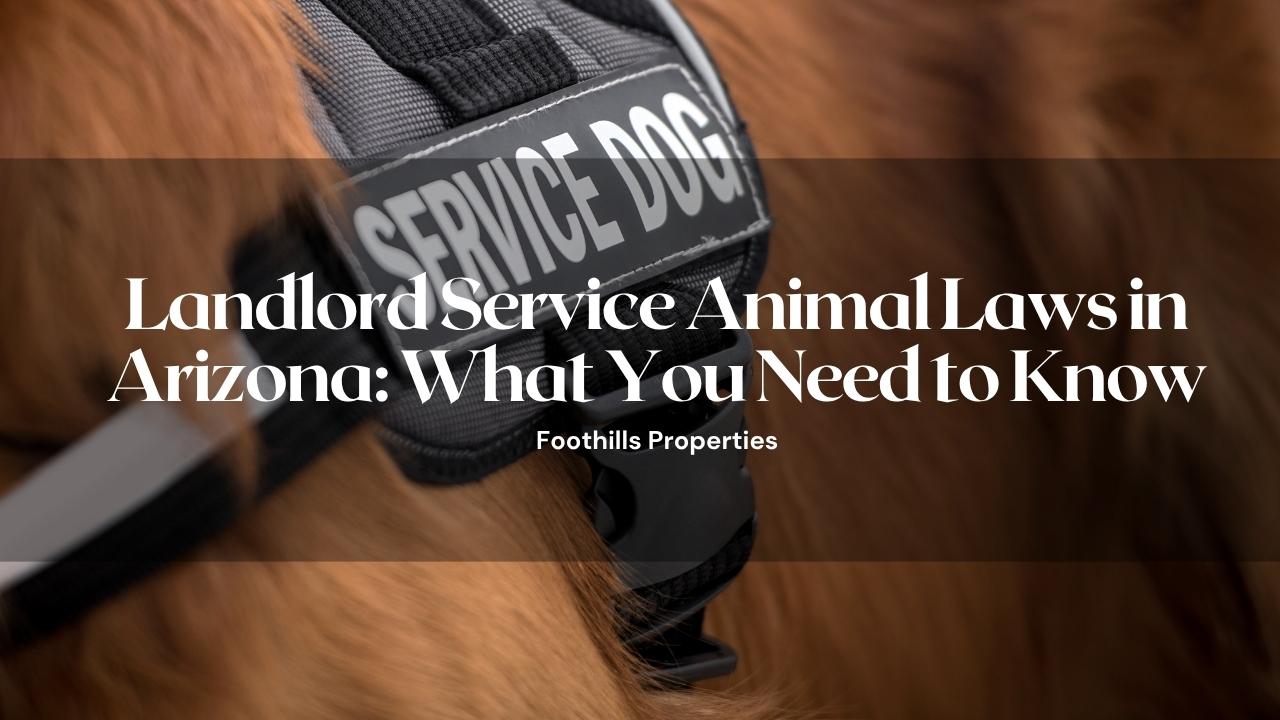
Understanding Landlord Responsibilities for Service Animals
At Tucson Foothills Properties, we often hear questions from landlords about what’s legally required when a tenant applies with a service animal. This is an area where misunderstandings can quickly lead to costly discrimination claims. The good news is that clear guidelines exist under federal and state law to help landlords stay compliant while protecting their properties.
What Qualifies as a Service Animal
The Americans with Disabilities Act defines a service animal as a dog trained to perform specific tasks for someone with a disability. These tasks might include guiding individuals with vision loss, alerting a person who is deaf or hard of hearing, assisting with mobility, or responding to medical conditions such as seizures or diabetes.

It’s essential to understand the difference between service animals and emotional support animals. Emotional support animals provide comfort but are not trained to perform a task. While they may receive protection under the Fair Housing Act (FHA), they are not recognized in the same way as service animals under the ADA.
What Landlords Can and Cannot Ask
When a tenant requests permission for a service animal, landlords are allowed to ask only two questions:
Is the animal required because of a disability?
What tasks or work has the animal been trained to perform?
You cannot request medical documentation, proof of certification, or specific details about a tenant’s disability. Those questions would violate privacy and fair housing laws.
If the need for a service animal isn’t obvious, a landlord may request reasonable verification from a licensed healthcare provider confirming the necessity, without asking for medical details.
Key Legal Obligations Under Federal Law
Both the Fair Housing Act and the Americans with Disabilities Act require landlords to provide reasonable accommodations for tenants with disabilities. In practical terms, that means:
Service animals must be allowed, even when a property has a “no pets” policy, which aligns with Arizona’s housing laws and broader obligations.
Landlords cannot charge pet deposits, pet rent, or additional fees.
Applicants cannot be denied housing simply because they have a service animal.
Exceptions exist only if the animal poses a direct threat to others or causes significant property damage. These exceptions must be based on documented behavior, not assumptions about breeds or disabilities.
Including clear and lawful terms in a lease helps prevent disputes and misunderstandings. Landlords often review what to include in a rental agreement when ensuring their documents meet current legal standards.
Managing Requests and Documentation
Each request for a service animal should be handled with professionalism and accuracy. Keep written records of every step:
The tenant’s request and your initial response
Any supporting documentation received
Follow-up communications or agreements
Consistent documentation helps protect both parties and provides a clear trail if issues arise later. A written policy on how your business manages accommodation requests can make the process smoother and more transparent.
Setting Expectations for Tenants

Even though service animals must be accommodated, tenants still carry responsibilities. They must keep the animal under control, clean up after it, and cover the cost of any damage beyond normal wear and tear.
Setting these expectations clearly at the start of a tenancy helps maintain a respectful and cooperative landlord-tenant relationship.
Handling Issues or Complaints
Occasionally, landlords face challenges such as noise complaints or property damage related to a service animal. These situations can usually be managed through standard lease enforcement procedures, provided everything is documented carefully.

If problems persist, it’s important to issue written notices and allow reasonable time for the tenant to resolve them. Legal guidance from a housing attorney can also help ensure compliance with discrimination laws before taking any formal action.
In some cases, professional management can make these processes more consistent. The benefits of hiring a property manager include structured systems for documentation, communication, and tenant relations that help maintain fair practices across all properties.
Understanding State and Local Variations
Federal law provides a foundation, but state and local rules may include additional protections or enforcement measures. In Arizona, for example, the law aligns closely with federal standards while also imposing penalties for falsely claiming an animal as a service animal.

Keeping track of these variations is part of responsible property management. Understanding how different regulations interact with the operation of profitable rental properties helps ensure compliance and long-term stability.
Key Takeaways
Service animals are legally distinct from emotional support animals.
Landlords must allow service animals, even under “no pet” policies.
Only two questions are legally allowed when verifying a service animal.
Documentation should be professional, consistent, and limited to necessity.
Tenants are still responsible for controlling and caring for their animals.
Final Thoughts
Service animal laws are designed to ensure equal access to housing while maintaining fairness for property owners. Staying informed and following proper procedures keeps everyone protected. If you’re managing rentals in Arizona and want to stay compliant, our team at Tucson Foothills Properties can help you stay ahead of these legal standards and maintain positive tenant relationships.








